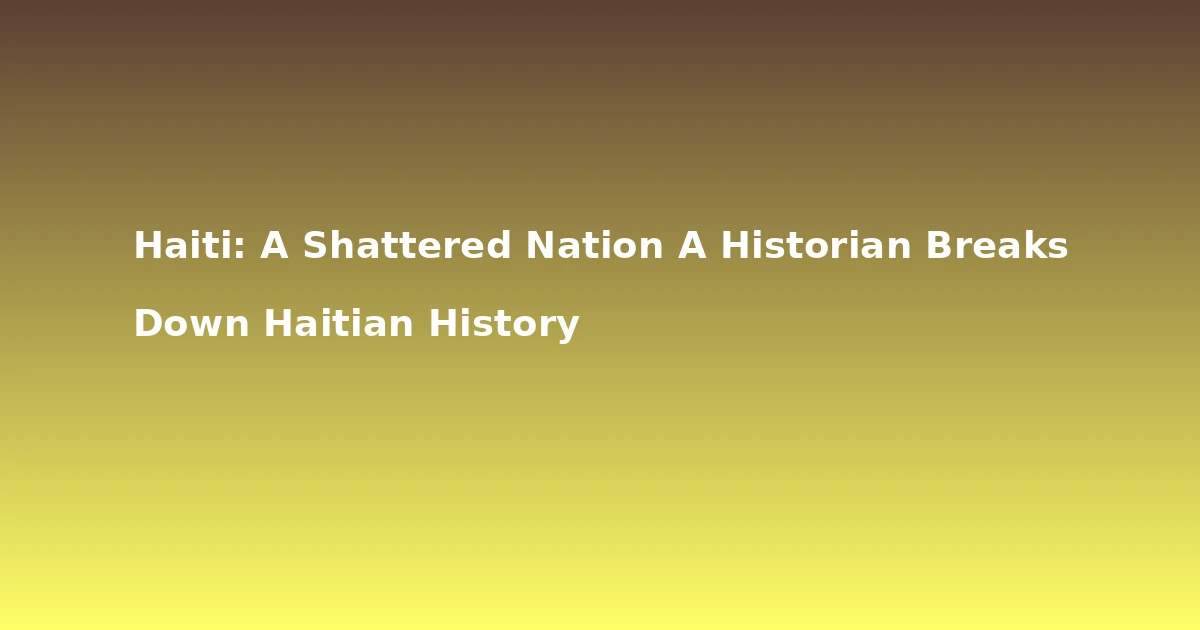Myrvine Bernadotte is of that generational segment born in Boston, and raised by Haitian parents, who came to the United States in search of a better life. Dr. Bernadotte contends both her parents were born and raised in Haiti under extreme poverty.
Upon their arrival in the United States, they stepped on the grounds of the land of the free, with almost nothing in their pockets. Her father arrived first, and left his wife Rosita and oldest daughter in Haiti. Dr.
Joseph H. Bernadotte was more fortunate than most, however, having battled poverty on the streets of Arcahaie and earned his medical degree from Haiti’s Faculté de Medicine (Haiti’s medical school).
But as usually is the case with individuals who have medical degrees from a foreign country, Dr. Joseph H. Bernadotte could not practice medicine in the United States.
So he worked several factory and odd and end jobs in the state of Massachussetts before he was able to learn enough English to pass the U.S. Medical board exams. Dr. Bernadotte’s wife arrived with a high school diploma, worked as a hotel maid and a factory assembler, and went to school and graduated as a registered nurse.
Now with such an inspirational family history, Myrvine Bernadette could not help but give her best in life. There were no excuses whatsoever. If two people past their 20s, who arrived in the United States practically penniless and not knowing any word of English could rise professionally, how much so for their seed—a daughter of the land?
From Massachussetts, the Bernadottes moved to Brooklyn, where they lived for nine years. Bernadotte’s family was so vast, that in the apartment complex where she lived, solely relatives occupied each wing.
Every day, she was reminded through the Haitian customs and culture that were part of routine life that, yes, she was a Bostonian, an American for sure; but she was Haitian. “I have always strongly identified with my Haitian roots, even when it wasn’t always popular to do so in Brooklyn in the 1980’s,” she recalls.
Like most upwardly mobile-minded Haitian families in New York, the Bernadottes moved their family to Long Island, where Myrvine attended high school. She later attended the University of North Carolina at Chapel Hill for college and Michigan State University for medical school. She’s since had a long career in emergency room medicine, but she has never forgotten about Haiti. Fast-forward to 2009, when she saw it fit to launch Inspire Haiti, a non-profit organization that provides medical care and medical supplies to the needy in Haiti.
Q & A
When was the first time you visited Haiti, and what were your impressions?
The first time I went to Haiti was in the late 1980’s. I was about eight years old. I was entirely put off by the country.
I was appalled by the poverty, lack of clean water, adequate water pressure and electricity. It seemed all the daily necessities I took for granted in the United States were nonexistent. It was a real culture shock!
Furthermore, my sister and I were devoured by mosquitoes. We both swore we would never go back. However, years later, just prior to entering medical school, I returned to Pignon, Haiti with my mother to volunteer our time and I fell in love.
Do you remember the first time you were inspired to become a doctor?
As a result of my parent’s educational background, I was always surrounded by medicine. I can recall at a young age listening, while my mother gave advice to relatives and community members. I learned to take blood pressure measurements before entering high school and quickly became the go to person in the family for this task.
However, the spirit of philanthropy and uplifting humanity came from my maternal grandmother. My grandmother, Meme, lived with us until the day she died at 88 years old. She was the caretaker all of our cousins, as well as my sister and I.
I can remember when she would return to Haiti for visits, she would have a small bag for herself and two extremely large suitcases full of items to give away to those less fortunate than we were. My Uncle would predictably complain, as he would be assigned to help her lift them to get to the airport. Nonetheless, she would always remind us of the importance of reaching back and lending a hand.
How did Inspire Haiti take shape?
Inspire Haiti was formed in late 2009, just prior to the devastating earthquake on January 12, 2010. Inspire Haiti was founded by eight individuals who met after endeavoring on an unrelated mission to Haiti in May of 2009.
As a group, we were startled to find that there were several areas of need that remained collaboratively unmet by any organization.
During the next several months, we engaged in continued dialogue about the patients we’d seen and treated in Haiti, in particular, a five-month old baby girl born with congenital syphilis. She initially presented with two broken arms and several other signs of abuse and neglect inflicted by her abusive mother. We repeatedly discussed the solutions that could prevent the insensible acts imposed on this child.
From those repeated discussions, the extensive background experience of all individuals involved and our love for a country in utter despair, Inspire Haiti was formed. Our objective is to improve the living conditions for the majority of Haitians: one person at a time, one community at a time.
You have a team in Haiti correct? Or do you just travel with a team from the USA?
Among our many long-term goals, envisions developing a community center in Haiti to provide medical education and services, after school activities, nutritional guidance, and social services. Currently, we organize mission trips to Haiti whereby groups of volunteers travel from the US to Haiti for a week at a time.
We have collaborated with community leaders in Cite Soleil, Hospitals in St. Marc, Paillant and Port Salut to conduct mission trips. During each mission trip, we travel with a team of medical doctors, nurses and community volunteers.
We provide the patients with medication they need and clothing for adults and children. We also make an effort to educate each patient on his or her health issue and preventative measures.
Within 4 days of the devastating earthquake of 2010, two members of IH and I were in Haiti volunteering our time and efforts to those in need. Additionally, those members remaining in the states mobilized themselves to gather supplies such as walkers, wheelchairs, clothing and medical supplies to send to Haiti. Since that time, we have returned to Haiti with groups of volunteers and served in various communities.
Currently, we are in the processes of building relationships with other organizations in order to grow and provide broader services to one community. In the near future, we would like to become more involved in the social aspects such as clean water projects, school building etc. Additionally, although Haiti is a markedly impoverished country, we firmly believe there is tremendous beauty in the land, vibrant and rich culture, food and language.
As a result, we strive to expose our volunteers to all of this during the week we are working in Haiti. Our volunteers are fed various classic Haitian dishes the entire week in Haiti. We often end the long and difficult week of working and living in harsh conditions with a visit to a beautiful location to decompress.
As a result, our volunteers have a different prospective of Haiti than what they may have seen in the media or heard of prior to visiting. In fact, many of them are eager to return to Haiti with us in the future.
How many people have benefited from Inspire Haiti so far, and how many towns have you served in Haiti?
We have visited several towns in Haiti including Paillant, St. Marc, Carpentier, Mason, Port Salut and several areas in Port-au-Prince.
Although it is difficult to give an exact number of how many people have benefited from IH’s services, I would say we have been fortunate enough to serve approximately 1000 people.
Haitian parents are always scolding, but they also like to give advice. What’s the best advice that’s ever been given to you by your parents?
My parents were definitely very strict with my sister and I. They were never reluctant to place us ajenou and the rod was never spared.
In addition, they believe it takes a community to raise a child. Our Brooklyn community of Aunts and Uncles, were all entitled to discipline us at any time. At the same time, although they were strict disciplinarians, they were also wonderful counselors to my sister and me.
My father would always say, “Piti, piti, zwazo fè nich li—little by little the bird builds its nest. Every time, I hit a bump in the road, my father would remind me of this and say nothing worth having comes easily. He taught me that obstacles are a part of life and should not always be avoided. Overcoming obstacles builds character, strength and integrity.
How did you make it through medical school?
Like all journeys I’ve faced, I made it through medical school by the grace of God and the support of an amazing family and circle of friends. Several are surprised to hear when I say that medical school was fun. I was fortunate enough to go to an exceptional school that focused intently on patients as human beings rather than a disease states.
I was also blessed to go to a school that recognize the importance of diversity in medicine and created an environment where I could feel comfortable and flourish. I met the most amazing friends in medical school. Without them and the community we created together, I am certain I would not have made it through.
For those out there who are going into medicine, what words of wisdom do you have to offer?
For those going into medicine today, I would urge them to have a real understanding of our healthcare system and what being a doctor entails. Medicine has become a lot more than simply helping people. There are several ways to make an impact on community without practicing medicine.
healthcare in the US is rapidly changing and we must be prepared to change with it. Beyond that if one were still determine to pursue a career in medicine, I would say to stay grounded and make sure you know who you are and what is important to you. Medicine can be all consuming if allowed to be so the act of prioritizing becomes paramount. Be certain to create a balance in your life.
Dr. Myrvine Bernadotte (in blue scrubs) and her staff attending to some patients during an Inspire Haiti medical mission trip.
You’re an ER physician. How do you maintain your cool in stressful situations happening constantly in the emergency room?
There is no other field in medicine that suits me more than emergency medicine. Working in the Emergency Department can at times be stressful.
The only predictable thing about it is its unpredictability. During times of stress, I stay calm by relying on God to guide and direct me. I also remain confident in my training and always stay humble.
During my residency, I did a rotation in the pediatric intensive care unit, and would be on call at night alone (my supervising physician was always available by phone and would come in from home if I needed). At times, I would be afraid to take a decisive action for fear I would be wrong and cause a critically ill child to deteriorate. A physician I admired told me to never be afraid to help.
He said that no matter what, a critically ill patient has a better shot of living with me, as a provider, than without, so do not hesitate to do something. He told me he would never be disappointed in me for being wrong but would be disappointed if I did nothing. I am never done learning.
My classroom is my colleagues, nurses, staff and patients. I realize that I don’t always have to have all the answers but I must know where to find them.
Few people will say that they have had it easy in life. What obstacles did you have to overcome?
My life has indeed not been without its fair amount of curve balls and windy turns, however, all things work for good and have helped to shape who I am today. Yet, certain aspects of my life have been more difficult than others.
The unexpected death of my beloved grandmother was extremely difficult for me. For me, she epitomized everything good in my world.
Additionally, my path to medical school was not a traditional one. I was initially not accepted into medical school from college. As a result, after college graduation, I worked and went back to school to improve my chances of getting into medical school.
I also obtained my Emergency Medical Technician license and volunteered with my local fire department. I entered medical school 3 years after graduating college. Initially, I felt as though my entire identity was in question. I was devastated by the prospect of never being a doctor because it was how I always envisioned myself.
In both of these instances, I ultimately came through it by remembering what my Father has told me, “Piti, piti….” So often in life, God’s plan is not clear to us or seems inexplicable. Nonetheless, I firmly believe that although I don’t understand, there is a reason for a storm or obstacle. I therefore lean on my family and friends for support to get myself through. I realize that I cannot and will not be easily broken.
Last Updated on December 4, 2025 by kreyolicious



